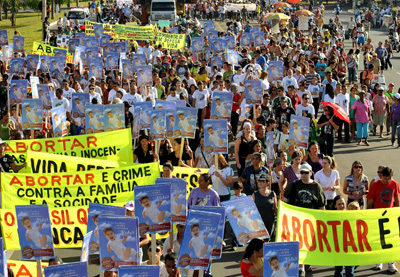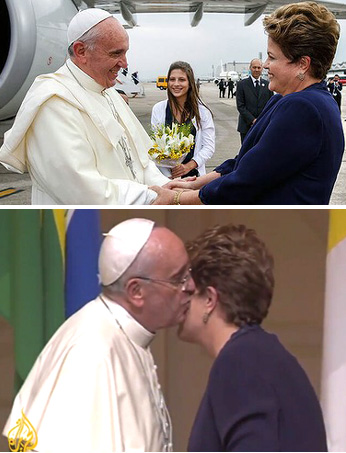Right to Life
 |
 |
 |
 |
 |
 |
 |
Echoes from Brazil
Doors Open Wide for Abortion
in the World’s Largest Catholic Country
August 1, 2013, became a day of mourning in Brazil’s history. On this date, reneging on the pledge she made during the presidential campaign, President Dilma Rousseff sanctioned the law opening the gate for the “killing of the innocents.”
Not only are her hands red with blood, but also the hands of those who favored the veiled and hasty way this law was approved by the two houses of the Congress. Particularly to blame are Minister of Health Alexandre Padilha and PT (Workers Party) House representative Iara Bernardi. But also culpable are the members of both Houses who voted for the bill, alleging that the word “abortion” had not been used in the text.
A brief history
This resolution was first presented by Iara Bernardi in 1999 and remained in limbo. It finally came to the floor in 2013. (1) The vote was one of the strangest ever to occur in the Brazilian Congress. Perhaps its deceitful title on ‘women who suffer sexual violence’ and the speed of its passage through all the necessary processes made it difficult to discern the content of the proposal.
 The person who took the initiative to bring this law to the floor was Rousseff’s Minister of Health. Thus, Rousseff reneged on the promise she made in the 2010 election that she would never approve abortion in Brazil.
The person who took the initiative to bring this law to the floor was Rousseff’s Minister of Health. Thus, Rousseff reneged on the promise she made in the 2010 election that she would never approve abortion in Brazil.
On February 20, 2013, Minister Padilha asked the House President Eduardo Alves to urgently proceed with approving a law that provided women who are victims of sexual violence with priority assistance at hospitals. The pretext was to commemorate the International Day of the Woman that was coming up on March 8. Consequently, that old resolution was recalled and presented by the leader of the Workers’ Party in the House on March 5, 2013, calling for an immediate vote.
The other party leaders gave their approval, and the measure was quickly set before the House Assembly. Discussion on the measure was verbal and rapid. None of the representatives had even been given time to read the law; nonetheless, it was approved unanimously on that same day, March 5. Why did none of the pro-life representatives rise to make any objections?
Three days later, the resolution was sent to the Senate for its vote. On April 10, the law was approved by its Commission of Human Rights. Finally, on July 4, the law was unanimously approved by the Senate. Then, it was sent to be sanctioned by the President.
The content of the law
This law addresses the assistance to be given to women who suffer sexual violence. It purposely avoids mention of the word abortion, although its primary purpose was specifically to allow abortion.
Article 1 rules that all hospitals - no exception is mentioned - “must offer immediate and complete assistance to anyone victimized by sexual violence, and send the person to the services of social assistance.”
“Immediate assistance” means that the service must be given upon request, without the delay of a single day. “Complete assistance” means that the pregnant woman should be either offered an abortion or sent to the already existing abortion agencies for an abortion. So, the “services of social assistance” to which the woman should be sent are abortion services.
Article 2 broadly defines “sexual violence” as “any form of non-consensual sex.”
 Given that the law does not specify that the victim needs to present proof she had non-consensual sex, and given that consent is a unverifiable subjective decision, it suffices for a woman to affirm that she did not consent to the act that caused her pregnancy for her to be entitled to have an abortion at any hospital.
Given that the law does not specify that the victim needs to present proof she had non-consensual sex, and given that consent is a unverifiable subjective decision, it suffices for a woman to affirm that she did not consent to the act that caused her pregnancy for her to be entitled to have an abortion at any hospital.
This means that every hospital, including Catholic ones, are obliged to allow a pregnant woman to have a legal abortion as long as she alleges that her pregnancy was caused by a non-consensual act.
What the Congress unanimously approved and the President sanctioned was similar to a resolution presented by the Lula government in 2008, which was defeated by a wide margin of votes. Now, five years later, both houses of Congress have unanimously approved a very similar law.
How can such a contradiction be explained? Was it due to the shrewdness of the government in disguising the law so politicians did not know what they were approving? Was it a tyrannical act of the government? Was it possible due to the corruption of the politicians? I lack the elements to answer these perplexing questions.
The shameful position of the religious authorities
Petitions with thousands of signatures were delivered to the Archdiocese of Rio de Janeiro requesting the Bishops to ask Pope Francis to say a word against the law of abortion during his stay in Rio, and to exhort President Dilma to veto it. I don’t know if the Bishops transmitted the request. What I do know is that Pope Francis did not say a word against the abortion law in his multiple public appearances. If he had done so, I believe Rousseff would not have sanctioned the law.
 The Brazilian Conference of Bishops, in its turn, did very little. Millions were expecting it to pressure the President to veto the project. Instead of asking for a total veto, it only requested a partial veto. It received nothing.
The Brazilian Conference of Bishops, in its turn, did very little. Millions were expecting it to pressure the President to veto the project. Instead of asking for a total veto, it only requested a partial veto. It received nothing.
The Conference of Bishops in Brazil has been a voice that lulls to sleep the good reactions of pro-life Catholics and the hand that extinguishes the flame of their enthusiasm.
The indignation of millions of Catholics did not find an echo in the voice of the religious authorities. One word from the Pontiff in his long, spectacular stay in Brazil would have sufficed to save the lives of millions of voiceless innocents.
The Pope, who has spoken so much about protecting the poor, in this case forgot to say a word to save millions of poor innocents from a criminal death. This omission occurred at the very moment when the situation was ideal for him to act - he was the center of attention of the country and the world. This omission took place during his visit to the country with largest number of Catholics in the world…

Not only are her hands red with blood, but also the hands of those who favored the veiled and hasty way this law was approved by the two houses of the Congress. Particularly to blame are Minister of Health Alexandre Padilha and PT (Workers Party) House representative Iara Bernardi. But also culpable are the members of both Houses who voted for the bill, alleging that the word “abortion” had not been used in the text.
A brief history
This resolution was first presented by Iara Bernardi in 1999 and remained in limbo. It finally came to the floor in 2013. (1) The vote was one of the strangest ever to occur in the Brazilian Congress. Perhaps its deceitful title on ‘women who suffer sexual violence’ and the speed of its passage through all the necessary processes made it difficult to discern the content of the proposal.

Rousseff did not honor her word
and approved abortion
On February 20, 2013, Minister Padilha asked the House President Eduardo Alves to urgently proceed with approving a law that provided women who are victims of sexual violence with priority assistance at hospitals. The pretext was to commemorate the International Day of the Woman that was coming up on March 8. Consequently, that old resolution was recalled and presented by the leader of the Workers’ Party in the House on March 5, 2013, calling for an immediate vote.
The other party leaders gave their approval, and the measure was quickly set before the House Assembly. Discussion on the measure was verbal and rapid. None of the representatives had even been given time to read the law; nonetheless, it was approved unanimously on that same day, March 5. Why did none of the pro-life representatives rise to make any objections?
Three days later, the resolution was sent to the Senate for its vote. On April 10, the law was approved by its Commission of Human Rights. Finally, on July 4, the law was unanimously approved by the Senate. Then, it was sent to be sanctioned by the President.
The content of the law
This law addresses the assistance to be given to women who suffer sexual violence. It purposely avoids mention of the word abortion, although its primary purpose was specifically to allow abortion.
Article 1 rules that all hospitals - no exception is mentioned - “must offer immediate and complete assistance to anyone victimized by sexual violence, and send the person to the services of social assistance.”
“Immediate assistance” means that the service must be given upon request, without the delay of a single day. “Complete assistance” means that the pregnant woman should be either offered an abortion or sent to the already existing abortion agencies for an abortion. So, the “services of social assistance” to which the woman should be sent are abortion services.
Article 2 broadly defines “sexual violence” as “any form of non-consensual sex.”

Ignoring the protests of the people, politicians rushed to pass a law allowing abortion to practically any pregnant woman
This means that every hospital, including Catholic ones, are obliged to allow a pregnant woman to have a legal abortion as long as she alleges that her pregnancy was caused by a non-consensual act.
What the Congress unanimously approved and the President sanctioned was similar to a resolution presented by the Lula government in 2008, which was defeated by a wide margin of votes. Now, five years later, both houses of Congress have unanimously approved a very similar law.
How can such a contradiction be explained? Was it due to the shrewdness of the government in disguising the law so politicians did not know what they were approving? Was it a tyrannical act of the government? Was it possible due to the corruption of the politicians? I lack the elements to answer these perplexing questions.
The shameful position of the religious authorities
Petitions with thousands of signatures were delivered to the Archdiocese of Rio de Janeiro requesting the Bishops to ask Pope Francis to say a word against the law of abortion during his stay in Rio, and to exhort President Dilma to veto it. I don’t know if the Bishops transmitted the request. What I do know is that Pope Francis did not say a word against the abortion law in his multiple public appearances. If he had done so, I believe Rousseff would not have sanctioned the law.

Amidst embraces and kisses, the Pope could have said a word to Rousseff against abortion
The Conference of Bishops in Brazil has been a voice that lulls to sleep the good reactions of pro-life Catholics and the hand that extinguishes the flame of their enthusiasm.
The indignation of millions of Catholics did not find an echo in the voice of the religious authorities. One word from the Pontiff in his long, spectacular stay in Brazil would have sufficed to save the lives of millions of voiceless innocents.
The Pope, who has spoken so much about protecting the poor, in this case forgot to say a word to save millions of poor innocents from a criminal death. This omission occurred at the very moment when the situation was ideal for him to act - he was the center of attention of the country and the world. This omission took place during his visit to the country with largest number of Catholics in the world…
- Prior to this law, Brazil had already approved abortions in two cases: 1.When the mother’s life is in serious danger; 2. In cases of rape. This last law was approved in 2005 under Lula’s term as President. For such cases, there are 64 places that provide abortions. With the approval of the recent law, the doors of abortion have opened wide for any case of a woman who claims she became pregnant having “non-consensual” sex, relying on her simple word. From now on, any hospital is obliged to either perform an abortion or send the woman requesting it to a place that provides it.

Posted August 5, 2013
______________________
______________________











